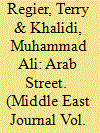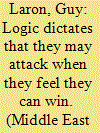| Srl | Item |
| 1 |
ID:
092628


|
|
|
|
|
| Publication |
2009.
|
| Summary/Abstract |
Understanding Arab public opinion is central to the search for sustainable political solutions in the Middle East. The way Westerners think about Arab public opinion may be affected by how it is referred to in their news media. Here, we show that Arab public opinion is rarely referred to as such in the US media. Instead, it is usually referred to as the Arab street, a metaphor that casts Arab public opinion as irrational and volatile. We trace the origins of this metaphor to similar expressions in both English and Arabic, and note similarities and important differences between the English and Arabic usages. Ultimately, we argue that the Arab street metaphor misrepresents the Arab public, and invites dismissal of rather than engagement with Arab public opinion.
|
|
|
|
|
|
|
|
|
|
|
|
|
|
|
|
| 2 |
ID:
092632


|
|
|
|
|
| Publication |
2009.
|
| Summary/Abstract |
This article examines and compares the Islamic resurgence movements in Iran between the 1950s to the revolution of 1979 and in Turkey from the 1950s to the present. It focuses on wide-ranging socioeconomic, political, ideological, psychological, historical, and cultural factors, in addition to the religious and spiritual motivations, behind the phenomenon of Islamic revivalism and intends to find the similarities and/or differences between the Islamization movements in both countries.
|
|
|
|
|
|
|
|
|
|
|
|
|
|
|
|
| 3 |
ID:
092631


|
|
|
|
|
| Publication |
2009.
|
| Summary/Abstract |
Scholars usually agree that the Israeli decision to attack Egypt in October 1956 was motivated by fear of an impending attack by the Egyptian army. That fear was spurred by the news of a large arms deal concluded between Egypt and Czechoslovakia in September 1955. However, Czechoslovak and Soviet reports, used here for the first time, reveal that the Egyptian army was encountering serious difficulties while trying to absorb these weapons. Newly declassified military intelligence assessments reveal that Israeli analysts maintained, even after the Czech-Egyptian arms deal, that the Egyptian army was no match to the IDF. The article goes on to explore the strategic consideration that stood behind the Israeli decision to go to war.
|
|
|
|
|
|
|
|
|
|
|
|
|
|
|
|
| 4 |
ID:
092629


|
|
|
|
|
| Publication |
2009.
|
| Summary/Abstract |
This article explores al-Qa'ida's concept of a sacred geography, focusing on the idea of "ribat" - maintaining watch on the frontier to defend Islam. Beginning in Afghanistan, fundamentalists have re-adopted this term from the hadith to characterize their struggle with the West, from al-Andalus to Palestine to Chechnya to Iraq. The implications for US policy are enormous, especially as it operates within the perceived Islamic patrimony. An understanding of ribat also helps explain why al-Qa'ida had no significant presence in Iraq prior to March 2003 but would soon thereafter.
|
|
|
|
|
|
|
|
|
|
|
|
|
|
|
|
| 5 |
ID:
092630


|
|
|
|
|
| Publication |
2009.
|
| Summary/Abstract |
For more than three years, Lebanon has been beset by a succession of political assassinations and disquieting public protests. Little is known about the views of the youth, roughly half the country's population, who have witnessed the enthusiasm and sense of national consciousness sparked by the Cedar Revolution of 2005. This article focuses on the narrative texts of returnee students at the American University of Beirut, exploring their hopes and disappointments. Such trenchant voices should be incorporated into the shaping of the public discourse and reconciliation currently underway.
|
|
|
|
|
|
|
|
|
|
|
|
|
|
|
|